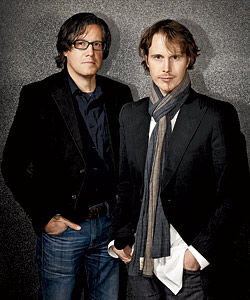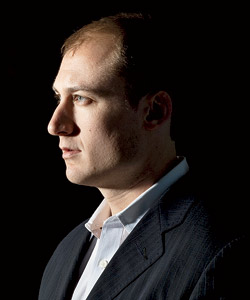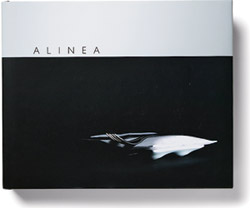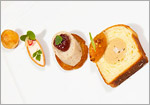
Nick Kokonas feels lousy. On a sunny late-winter afternoon, he’s on day 3 of a course of antibiotics to swat down a severe ear infection—that, on top of a yearlong, gray-hair-producing stint as the de facto general contractor of Next, the new restaurant he is building with his business partner, the chef Grant Achatz. Shambling around his Old Town home in jeans and a T-shirt, Kokonas leads me up a flight of stairs, lined with neat stacks of unopened mail, to his light-filled office in the attic. He brings up a spreadsheet on his computer and pounds the cushioned seat of his old drummer’s stool, a signal for me to sit as I peer over his shoulder at the numbers behind Alinea, the newly minted three-star Michelin restaurant in Lincoln Park and one of Chicago’s great success stories.
“The only reason I’m willing to show all of this to you, frankly, is because people criticize it without stopping to think from a business standpoint,” he says. He’s referring to some grousing on the web about the decision late last year to drop Alinea’s $145 multicourse menu in favor of offering only the larger $195 version. “It’s not because we want to make more money. It’s because we’re thinking long term. We’re really, really trying to steer Alinea toward being the best in the world.” Alinea actually makes less money since eliminating the cheaper menu. Because the 22-course meal takes four hours to consume, the restaurant can book its 18 tables just once per night, except for the handful that can be reseated by 9:30 p.m. “We can do two [seatings per table of the] $145 menus,” says Kokonas. “Which would you rather bring in? It’s a net loser for us to do the $195 menu only.”
The only child of a Greek entrepreneur from Chicago who wanted his son to become a lawyer, Kokonas, 43, is the majority stakeholder with Achatz in Alinea and its recent spinoffs, Next and The Aviary. (Both were scheduled to open in April, after this story went to press.) He met Achatz shortly before retiring from a lucrative ten-year run as an independent derivatives trader; he was a customer—at Trio, the four-star Evanston restaurant and precursor to Alinea—who became a fan. Married to his college sweetheart, with whom he has two school-age children, Kokonas fits the mold of a certain kind of restaurateur: the high-energy control freak who prefers to remain anonymous (“It’s better to be rich than famous,” he tells me offhandedly one day). But with the publishing in March of Achatz’s memoir, Life, on the Line, for which Kokonas takes a cowriting credit, he is stepping out a bit.

“Grant and I are the only two people who can handle the marketing stuff,” he says. “It’s almost like running a political campaign. You have to be on message. We know what we want the identity of Next and The Aviary to be and what the goals are. As soon as we [delegate the job] to someone else, it starts looking corporate really fast, and I don’t want it to feel corporate.” In his PR capacity, he fields media and appearance requests, monitors the Internet for mentions, corresponds with bloggers, and writes copy for the partnership’s various websites. He recently took it upon himself to adapt the memoir into a screenplay; David Dobkin (Wedding Crashers) is attached to the project as the director. “This is what I do at two in the morning while I drink my pinot,” Kokonas says.
This elaborate gesture—a restaurant backer inviting a reporter to his house to look at spreadsheets—is, in fact, pure theatre. For the record, Alinea makes about $1 million in profit in a good year, on a margin that ranges from 8 to 18 percent of gross receipts, depending on consumption, food costs, and equipment replacement; this past January, Alinea made a profit of $60,000 on $500,000 in revenue, or about 12 percent—staggeringly high compared with the restaurant industry’s target of 5 percent. The numbers, however, may be the least interesting aspect of the business. The intriguing supporting narrative is that Achatz, the visionary, has found in Kokonas, the money guy, a partner who is perfectly in tune with his desire to try new ideas, push boundaries, and reinvent the wheel when necessary. More than just making great restaurants, together they’re building a tiny empire of innovation, one cool project at a time.
Their new place—called Next, as if to underline and boldface their caffeinated impatience with what’s past, boring, or stupid—innovates on many levels. For starters, its concept pretty much blows out of the water the usual phrase mash-ups used to describe new restaurants, such as “seafood-centric American chophouse” or “Israeli comfort food meets Chipotle.” A 62-seater on Fulton Market in the West Loop, Next will give itself an extreme makeover about every three months. It starts with a menu that sounds more like a graduate seminar in the history of gastronomy—a painstaking re-creation of haute French cuisine as prepared by the famous Parisian chef Auguste Escoffier circa 1906. David Beran, the restaurant’s 29-year-old executive chef and Alinea prodigy, plans to follow that audacious opening act with a menu that channels some kind of authentic Thai food.
Satisfied that the culinary concept was not an Alinea copycat, Achatz and Kokonas are also trying to make the new restaurant somewhat more affordable. Over the course of managing Alinea’s reservation system, they noticed that everyone in Chicago wants to dine at 7 p.m. on Saturday. “We are paying three full-time reservationists to basically tell people no,” Kokonas has said. For Next, they decided to sell tickets instead. Tickets—which are nonrefundable and bill customers up-front for extras such as wine or beverages, plus tax and an 18 percent service charge—give the restaurant guaranteed advance cash flow. They have the added benefit of eliminating some costly inefficiencies, including money-losing cancellations and “bleed-outs,” the term Kokonas uses for parties of three that sit at tables for four (remedied by the rather Draconian measure of selling tickets in blocks of two or four). As a result, the prices at Next will be lower than Alinea’s; Kokonas estimated that food-only tickets might run from $110 per person at peak-demand hours on Fridays and Saturdays to as low as $65 on slower nights.
Trouble is, the software system needed to sell these tickets didn’t exist. Solution? Kokonas hired a programmer to build one from scratch. His hunch is that this minor up-front investment could become a lucrative business down the road—an easy-to-use web-based ticketing platform for restaurants might well catch on as a lower-cost alternative to OpenTable, the industry’s leading online reservation system.

The Aviary, the cocktail lounge next door to Next, is another example of reinventing something that isn’t nearly as good as it could be. The concept is a restaurant for drinks—not because Achatz wants to turn booze into food (although he might do that) but because the highly organized kitchen system is probably a better way to make complicated things, such as artisanal cocktails, on demand. “I love The Violet Hour, love The Drawing Room,” says Kokonas, referring to two local bars that lead the hand-crafted-cocktail trend. “But you have bartenders, who are incredible artisans, having to handle 200 people. They have to cut their limes and make the drink and taste the drink and wash the shaker and wash the glasses—and it doesn’t work!”
The Aviary’s chefs, by contrast, aren’t even out on the floor of the bar but rather are cloistered behind a scrim, where each will focus on making only five or so of the menu’s complicated drinks. The goal is precision and speed, supported by an environment that doesn’t swing wildly from dead as a doornail to four deep at the bar. “The whole reason I know we’ll be full consistently is because we’re not packing people in,” says Kokonas. “Once people go there, they’re going to say, ‘Wow, this is a different, better experience.’” Located in the former Fulton Lounge space, which had a legal capacity of 299 people, The Aviary may indeed feel like a monastery by comparison, with its strict maximum seating for 72 and standing room for 14. The bar does not take reservations and, in the event of a waiting list, sends text messages to customers when tables open. Serving a couple dozen original cocktails, a few seasonal classics (a sidecar in the spring; a Jack Rose—we had to Google it—in the winter), and Alinea-like finger food, the lounge seems destined to become a play land for the geek drinker.
Achatz and Craig Schoettler, The Aviary’s 24-year-old executive chef and yet another baby-faced impresario, have paid special attention to the standing area so that the customers there don’t feel like second-class citizens. “We want the people sitting to be jealous of the people standing,” says Schoettler. Standees might be regaled with a “sod” course—food and drink presented on a section of actual grass. What this is meant to evoke is not entirely clear. Golfing? Attending Lollapalooza? Chores? On the other hand, who else in the history of drinking joints has given even a moment’s thought to the unlucky blokes who can’t get a seat?
Kokonas thinks all of the above is fairly “awesome”—but he loves to talk about the cookbook. In 2006, he and Martin Kastner, the Czech metalsmith who designs special serving pieces for Achatz and Kokonas’s restaurants, began researching cookbooks and were disheartened to discover that even some of the best were dominated by pages and pages of recipes with no pictures. They realized, by cracking apart the spines, how publishers were saving money: The large, beautiful color photographs were strategically placed so they could be printed together in sections, and there weren’t many of them. Curious to know the true cost of printing, Kokonas called around and found out that even the most lush cookbooks could be made, overseas, for as little as $3 each. “So when they offer you $200,000 for a book and they tell you, ‘Well, our production cost will far exceed your advance, so you’ll have to give it all back,’ it no longer looks like a deal,” he says.
So Achatz and Kokonas self-published Alinea—in the end, a 396-page, six-pound coffee-table crusher with full-color photography on nearly every page—and did it for just $9 a book, including the dust jacket and shipping. They have sold 65,000 copies, some at wholesale and some through Alinea’s website for $31.50. “I would compare it to Charlie Trotter’s big $50 cookbooks,” remarks Aaron Wehner, the publisher of Ten Speed Press, which managed Alinea’s production and distribution in an unusual deal for a cut of the wholesale gross. According to him, Achatz’s cookbook will soon surpass Trotter’s best-selling original, published, also by Ten Speed, in the mid-1990s. “I was told by two major cookbook publishers that there [was] no shot [we’d] sell more than 5,000 of these,” Kokonas recalls. “We sold 5,000 before we went to print.”
Perhaps even better than Achatz, Kokonas understands that the dining experience they’re peddling is a rarefied, high-end product—“Nobody has to eat this way,” he likes to say—and that restaurant ventures are fraught with risk. He is also fully aware that the business owes its mojo, a fragile commodity in any market, to the prolific genius of Achatz, who has emerged, postcancer, as an articulate and accessible celebrity chef; the chef is also extremely mindful of not allowing the food or the brand to devolve into gimmickry. And, although generally low-key and affable, Kokonas does have his moments of pugnacity. “Someone wrote on Facebook that they think it’s discriminatory that we’re not going to offer a vegetarian Paris 1906 menu, and I say, no, I’m not discriminating against anyone. Anyone can come to my restaurant; you just have to eat what we serve,” he says, noting that common food allergies are accommodated. “My default is always, like, I think what we’re going to do is going to be pretty extraordinary for the money. If you don’t want to come, don’t come. It’s not arrogant. It’s just what we do.”





Comments are closed.